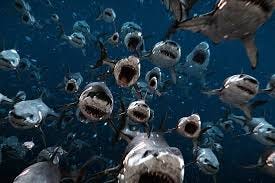Abraham, Daniela and Jaws
My thoughts on Abraham’s Boys, Daniela Forever and Hot Spring Shark Attack
Based on the short story of the same name by Joe Hill, Abraham’s Boys takes one of the most famous works in the history of the horror genre, Bram Stoker’s Dracula, and uses it as a leaping-off point based nor around the title character but on the man who slew him in the end, Abraham Van Helsing, and what happened to him after those events. Set in 1915, about 18 years after said events, we learn that Van Helsing (Titus Welliver) wound up marrying Mina Harker (Jocelin Donahue) and they have relocated to rural California, where they live in a remote home with their two children, teenager Max (Brady Hepner) and younger son Rudy (Judah Mackey). Far from the benevolent oddball in most versions of the story, this Van Helsing is a stern taskmaster who has theoretically put his vampire killing days behind but who is paranoid that he and his family will one day again be set upon by the forces of darkness, a feeling that is exacerbated as Mina is struck by a mysterious illness and the area is hit with a string of murders. While Van Helsing becomes increasingly harsh and unhinged, his sons grow increasingly suspicious of his behavior—not to mention the contents of his always-locked study—and they are forced to consider the possibility that their greatest threat is close to home.
The film was adapted and directed by Natasha Kermani, who received no small amount of acclaim in genre circles for her intriguing 2020 head-spinner Lucky. As her long-awaited feature follow-up, not counting a contribution to 2023’s V/H/S/85, Abraham’s Boys sounds promising enough on paper but never quite develops into anything particularly interesting. The conceit is that guilt and familial angst can be just as horrifying and deadly as your typical bloodsucker—perhaps even more so—but it hasn’t been dramatized here in a particularly interesting manner. Once the basic premise of the story has been established in the early going, it doesn’t really have much of anywhere to go for the next hour until it finally arrives at its climax—this is one of those stories where the big twist is telegraphed so early on (especially if you have seen a certain cult horror favorite that must go unmentioned here, lest it be regarded as a spoiler) that you half-expect it to be merely a set-up for a bigger switch-up, only to find that this is not the case. Kermani does a good job of establishing an atmosphere of suffocating dread that plays nicely against the California background and the performances are solid enough. Unfortunately, Abraham’s Boys lacks that final spark of imagination that might have made it into something other than a stab at slow-burn horror that fizzles out long before the end
.At the start of the new mind-bender Daniela Forever, Madrid-based DJ Nicolas (Henry Golding) is still reeling from the recent accidental death of his girlfriend Daniela (Beatrice Granno) and in the throes of a depression that is threatening to overtake his life entirely. A well-meaning friend tries to help him seek some relief from his memories and the grief they inevitably inspire by getting him enrolled in an experimental drug trial designed to help him heal via a pill that allows for lucid dreaming following specific prompts. After messing up his first set of instructions after taking the pill, he instead thinks of Daniela and he winds up having an incredibly vivid dream that essentially allows him to reconnect with her. He continues with the program that he can continue to be with her, at least in theory, and while there are hiccups—his dream world and the experiences within are limited by his own memories and experiences—he is able to work around them by fully embracing the real world during the day in order to make his dream existence more vivid. However, when the dream Daniela begins to demonstrate behaviors that are unfamiliar to him, Nick tries to wrestle with the metaphysical implications of this along with the possibility that perhaps he did not know her as well as he liked to think that he did.
Merging together thematic elements from such films as Eternal Sunshine of the Spotless Mind and Inception, Daniela Forever is a mix of heady sci-fi, romantic melodrama and wry social satire and while it is certainly ambitious, it never quite manages to pull all of its ideas and concepts together into a cohesive whole. This is a bit disappointing consider that it is the new film from Nacho Vigalondo, whose previous feature, Colossal (2016), was an equally audacious, though altogether more successful, work that told the story of a down-on-her-luck party girl in America who discovers an inexplicable connection between her seemingly insignificant existence and a kaiju wreaking havoc halfway across the world in Seoul. That film had a nutty premise, to be sure, but it was one that was fully fleshed out and went off in surprisingly profound directions. Daniela Forever, on the other hand, is more scattershot and once it establishes its undeniably intriguing premise, it fails to develop it in a particularly meaningful manner, leading to same kind of dead ends that Nicolas encounters as he tries to make sense of the dream world and its rules. This is especially true in the case of Nicolas, who is gradually revealed to be less sympathetic and more self-involved that originally depicted (when the dream Daniela wants to have a threesome with Nicolas and another guy, he conjures up a double of himself to serve as the extra party) but doesn’t really examine this aspect of his personality to any significant degree. Still, there are pleasures to be had here—the performances from Golding and Granno are good and the visual style, in which reality is represented via grainy footage presented in the boxy Academy ratio and the dream world is seen in vivid and vibrant widescreen imagery, is striking, especially in the later scenes when the division between Nicolas’s waking and dreaming states begins to blur. Daniela Forever is perhaps just good enough to hold your interest for most of its running time but ultimately not good enough to live up to the promise of both its premise and the talents of those involved with making it
.If you ever wondered what a Sharknado film might have been like without the lucid plotting, quality acting, lavish special effects and quiet dignity that the franchise was famous for, then the new Japanese import Hot Spring Shark Attack might be right up your alley, though even those people might grow weary with it long before it comes to its merciful conclusion. Famed for its celebrated hot springs, the Japanese city of Atsumi is in the midst of a massive development project spearheaded by its greedy mayor to lure tourists to visit both the springs and a massive resort complex created entirely by a giant 3D printer. Alas, the construction has managed to awaken a long-thought-extinct breed of shark with bodies flexible enough to allow them to travel through the various pipes leading to and from the springs and chomp on unsuspecting bathers. At first, the mayor scoffs at the news brought to him by the chief of police and an eager young marine biologist but when a group of influencers brought in to publicize the resort get chomped up and the entire town is threatened with destruction, it is up to the police chief and the scientist, aided by a mysterious bodybuilder who likes to punch sharks, to kill the beasts and save the day.
As you can probably surmise from the title and premise, Hot Spring Shark Attack is clearly not meant to be taken seriously and even if you have somehow deluded yourself in that regard, the deliberately clumsy and cheesy special effects (ranging from CGI that would have looked dodgy 25 years ago to unconvincing miniatures to an attack victim being represented by what appears to be a Barbie knockoff doll) should hopefully convince you otherwise. Alas, the “it-is-supposed-to-look-crappy” conceit proves to be the film’s only joke and it does not improve upon repetition—what might have barely passed muster as a two-minute parody trailer in a Kentucky Fried Movie-style hodgepodge or as a SNL skit proves to be absolutely excruciating at 70-odd minutes, which barely qualifies as feature-length by today’s standards but will not leave anyone yearning for an extended version. Little more than a cinematic prank in which the audience is the ultimate butt of the joke, Hot Spring Shark Attack is the kind of film that seems to have been created exclusively to fill the less desirable time slots at genre-based film festivals, where the title and basic description in the program might lure in a few viewers eager to demonstrate that they are in on the alleged joke by braying laughter at every example of incompetence. All I will say is that while this is almost certainly not the worst shark-related movie ever made—it doesn’t even have that ambition—it is maybe the first that I can recall where I would advise you to skip a film and stick with the likes of Jaws: The Revenge instead






